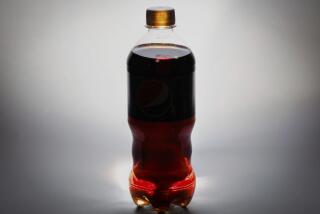Experts Tell Panel of Continued Concern Over Use of Aspartame
- Share via
WASHINGTON — Scientists said Tuesday that they remain concerned about the possible link between the popular artificial sweetener aspartame to such health problems as epileptic seizures, birth defects and severe headaches, despite numerous studies that indicate it is safe.
“Within the scientific community, real controversy persists concerning the unlimited aspartame consumption for all people,” Dr. Richard J. Wurtman, a neuroscientist at Massachusetts Institute of Technology, said at a Senate Labor and Human Resources Committee hearing.
Aspartame, marketed under the brand name NutraSweet, was approved by the Food and Drug Administration for use in dry foods in 1981 and carbonated drinks in 1983. It is consumed daily by millions of Americans as a sweetener and as an additive to sodas, gelatin, chewing gum and dozens of other products.
Tells of Arm Tremors
Air Force Maj. Michael Collings testified that during a period of two years he suffered a series of uncontrollable arm tremors, which ended soon after he stopped drinking liquids containing NutraSweet. The attacks culminated in a seizure, but Collings said he has had no further problems since he quit using the sweetener in October, 1985.
However, FDA Commissioner Frank E. Young said that studies conducted by independent scientists and supported by his agency have not established a consistent link to any single medical problem.
“We do not have any medical or scientific evidence that undermines our confidence in the safety of aspartame,” Young said. “It’s very hard to establish a cause and effect relationship.”
3 of 3,500 Complaints
Young told Sen. Howard M. Metzenbaum (D-Ohio), who conducted the hearing, that only three of the 3,500 customer complaints his agency has received about aspartame have directly linked the compound to medical problems.
But Wurtman said that relatively low doses of aspartame can raise the brain’s level of phenylalanine, an amino acid that is a principal component of the compound, which may lower a person’s threshold to epileptic seizures.
Dr. Louis J. Elsas II, a professor of pediatrics at Emory University in Atlanta, said that higher phenylalanine levels produced by aspartame in pregnant mothers can raise levels of the amino acid in fetuses, causing a threat of mental retardation and birth defects.
Dr. William M. Pardridge, a professor of medicine at UCLA, said that phenylalanine is a “known neurotoxin,” and said he fears the pervasive use of aspartame could be harmful to small children.
Sees Waste of Resources
John D. Fernstrom, a neuroscientist at the University of Pittsburgh’s Western Psychiatric Institute, however, said that aspartame does not significantly change brain neurotransmitters as some researchers claim. He said that calls for further study of the compound are a waste of resources.
“Enough is enough; it is time to move on,” Fernstrom said. “There are simply too many substantive issues that await investigation in the area of nutrition and brain function to waste further effort being obsessive about something that isn’t there.”
Robert B. Shapiro, chief executive officer of the Illinois-based NutraSweet Co., said that approval of aspartame in dozens of countries proves the validity of scientific literature supporting its safety.





